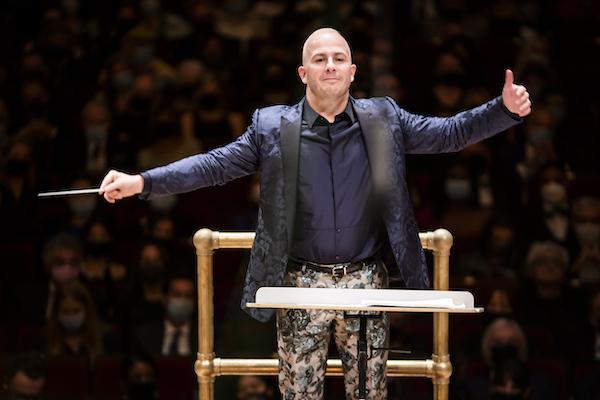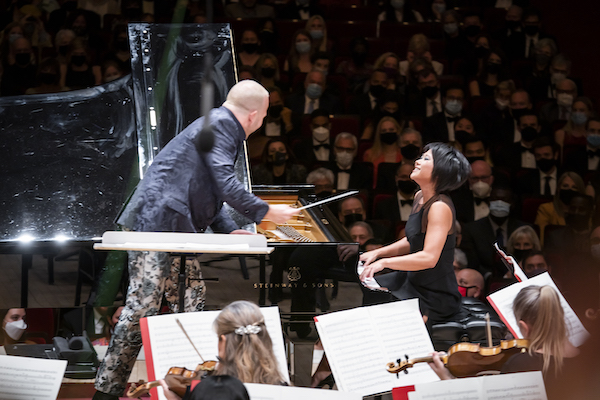Philadelphia Orchestra reopens Carnegie Hall with blazing bravura

The lights are coming back on all over New York.
Wednesday night, Carnegie Hall joined the New York Philharmonic and the Metropolitan Opera in reopening their hall after a year-and-a-half hiatus. Christening the 2021-2022 season were a group of welcome, old friends: the Philadelphia Orchestra, conductor Yannick Nézet-Séguin, and pianist Yuja Wang. Wang played Shostakovich on a program that mixed recent works from Valerie Coleman and Iman Habibi with familiar Bernstein and Beethoven.
The mood was celebratory and forward-looking. Finishing with Beethoven’s Symphony No. 5 was an obvious triumphal gesture after the pandemic experience of 2020-2021. But the feelings on the evening went deeper, and were more positive than just passing through a rough time—so much so that the greatest musical experiences came before the final piece.
Spirits were high and warm in the audience, and the musicians were clearly bursting with joy and eager to be playing in the hall again after 560 days absence. There was a surplus of energy, not just in getting from one note to the next but in the sense of starting out on a long-awaited journey. This was often thrilling, right in the gut, but there was also a feeling of restless impatience, trying to fit too much into too small a space, that didn’t always serve the music well.
Speaking before the final two pieces, Nézet-Séguin acknowledged all the deaths over the last 18 months, but this was not a memorial event. That was so even with Coleman’s Seven O’Clock Shout, which has become the orchestra’s unofficial anthem, opening the concert. The music is specifically about the pandemic experience—not a reference to Count Basie—but to the impromptu social ceremony of people cheering, applauding, and banging pots and pans for healthcare workers at their 7p.m. shift change.
More than that, written during the pandemic, it was premiered in an online video last year with the orchestra members playing remotely. It’s a wonderful piece, and an exceptional fit for the rich colors of this orchestra, and was a powerful experience live. A combination fanfare and lyrical work, it has the classic sound of American orchestral music from the middle of last century, with rich harmonies and the cruising forward flow of a streamlined locomotive. Perhaps it is the Philly players who are poisedto take up the banner of modern American music. Coleman’s piece, with its lovely mix of poise, strength, melancholy, and humanity, is not just a starting point for the orchestra but a worthy extension of this tradition—it deserves to be a staple in the orchestral repertory.
Yuja Wang and the orchestra were exceptional in Shostakovich’s Piano Concerto No. 2, a performance that will linger in the memory for a long time. One is familiar with the bravura passion and power in her playing, and she’s also shown a lot of wit on stage. That came through with tremendous expressive and intellectual depth in the concerto, and was a profound window into the mysteries and many layers of Shostakovich.
Wang’s phrasing in the opening movement was extraordinary. She delivered the playful phrases with so many nuances of dynamics and touch, adding unsuspected quizzical wistfulness. The unanimity between her and the gorgeous Philly strings was impressive, especially in the Andante, which had an incredibly delicate and deliberate surface with a chasm of complex feelings underneath. The orchestral sound was superb, the strings impossibly velvety and free of sentimentality. After the understated middle movement, the tempo of the finale was giddy, and Wang got to show off the immense precision and clarity of her articulation.
In retrospect, that headlong pace might have been a bit reckless but it carried over into Bernstein’s Candide Overture, and then again in Beethoven’s Symphony No. 5, and the results were less successful. Candide was simply too fast. It was exciting to hear the orchestra play the music cleanly at this tempo, but even with all the notes there, some of the music was missing. Bernstein works with rhythm in the music to make a feeling of skating over thin ice, but it only works if the outline of the pulse is there. Wednesday night the music spun away so fast that it wiped away both the downbeat and a clear pulse.
Habibi’s Jeder Baum spricht was the penultimate piece, serving as an attacca introduction to the Symphony No. 5. Dated 2019, it was written for the Beethoven 250th anniversary celebrations the Philadelphia Orchestra planned, and was lucky to receive its premiere at the orchestra’s last live 2020 concert (March 12). The title comes from a phrase Beethoven wrote in his notebooks, “Every tree speaks…”, and is full of unsettled, even chaotic energy. Habibi has full control of his materials, and Wednesday night the music had an exciting sense of purpose, of both unsettling and intriguing the ears, opening up ground for musical and emotional resolution. The composer means to offer hope by turning attention back to the natural world that was such an inspiration for Beethoven, and Habibi’s flashing sounds and jagged complexity was like seeing the mix of leaves, branches, light, and shade in a forest.
The work’s lean prickliness carried over immediately into the Fifth Symphony. The first movement had a fast tempo but an even faster pace, with absolutely no lingering on the last note in the famous four-note motif. Even the languorous oboe solo, played with care and expression by Philippe Tondre, was framed with a feeling of great tension that didn’t last.
The playing remained lean, even through the Andante and technically the orchestra articulated everything. But the pace became unregulated, and the finale turned into a helter-skelter rush to the finish line. It was like the end of a great party, when everyone has had too much to drink and is talking all at once with good natured bluster.
But this was just the first night of Carnegie—and of the Philadelphians’ Beethoven cycle—so the party is really just beginning.
Yannick Nézet-Séguin conducts the Philadelphia Orchestra in Beethoven’s Symphonies Nos. 4 and 6, 8 p.m., October 20. carnegiehall.org







